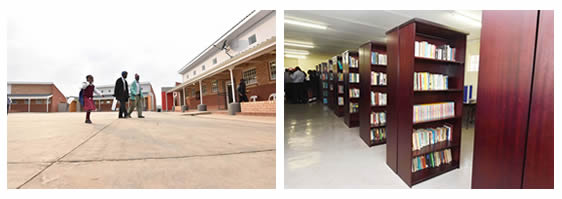New schools for SA learners
New schools for SA learners nthabiThe Department of Basic Education’s drive to ensure that learners have access to decent education is bearing fruit.
 Through its Accelerated Schools Infrastructure Development Initiative (ASIDI), the department has been unveiling state-of-the-art schools every week across the country.
Through its Accelerated Schools Infrastructure Development Initiative (ASIDI), the department has been unveiling state-of-the-art schools every week across the country.
Recently, the department handed over the cutting edge Lucingweni Primary School on the outskirts of Mthatha, in the Eastern Cape, which cost R29 million to construct.
While in the North West the MEC of Public Safety Dr Mpho Motlhabane also handed-over Toevlug Primary School, a state-of-the-art facility worth R37 million, to the community of Toevlug.
During the official handover, MEC Motlhabane urged members of the community to ensure that the school becomes a centre of excellence.
“Government has made this investment in this community, it is now up to you to double that investment by ensuring this school is kept in this beautiful state.”
Since the programme’s inception, the initiative has led to the completion of just over 170 schools out of a targeted 510 around the country, with 126 of them situated in the Eastern Cape.
Provincial education departments continue to deliver services such as water, sanitation, electricity and other resources through the Education Infrastructure Grant. Although there remains a backlog, progress is being made to address infrastructure challenges.
The department also stated that the schools, which are mainly constructed in rural and underprivileged urban areas, come standard with a science lab, computer lab, media centre, rain water harvesting tanks, nutrition centre and fully-functional administration block with offices and staff room.
“All ASIDI schools meet the minimum norms and standards and, in some cases, exceed these requirements.”
All ASIDI schools meet the minimum norms and standards and, in some cases, exceed these requirements.
The programme also includes a basic services component over and above the school-building programme. To this end, an additional 615 schools have been provided with water, 418 with decent sanitation and 307 with electricity.